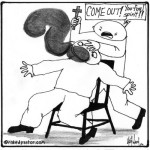We run our website the way we wished the whole internet worked: we provide high quality original content with no ads. We are funded solely by your direct support. Please consider supporting this project.
How do you respond to Acts 4:27–28?
The Christians in Jerusalem proclaim to the Lord, “…both Herod and Pontius Pilate, with the Gentiles and the peoples of Israel, gathered together against our holy servant Jesus… to do whatever your hand and your plan had predestined to take place.”
This passage tells us that Herod, Pilate, the Gentiles and the peoples of Israel carried out God’s predestined plan, not that they were individually predestined to carry out God’s plan. That Jesus was going to be killed was settled ahead of time. Who would kill him was not.
Category: Q&A
Tags: Q&A, Responding to Calvinism
Topics: Providence, Predestination and Free Will, Responding to Objections
Verse: Acts 4
Related Reading

What do you think of the left wing Christians who are calling on Christians to stand up for “biblical justice”?
Yes, we’ve been hearing a lot of this recently, especially from more “progressive” (left-tending) Christians calling on people to vote “God’s politics” and stand up for “biblical justice.” On the one hand, I along with everyone else applaud such rhetoric, for what Bible-believing Christian in their right mind would take a stand against “biblical justice”?…

What do you think of “confrontational evangelism”?
Question: In The Myth of a Christian Nation, you emphasize our need to sacrificially serve others. But you didn’t emphasize our need to “preach the Gospel to every living creature.” I’ve been intrigued by the movement known as “confrontational evangelism,” associated with Ray Comfort and Kirk Cameron. They stress the need to get people to…

In a democracy, don’t Christians have a responsibility to participate in politics?
Question: You’ve argued that Christians shouldn’t try to gain power in government on the grounds that Jesus didn’t try to gain power in the political system of his day. But his government didn’t allow for such power. Caesar and Pilate weren’t elected by anyone. Our government allows for this. So don’t we have a responsibility…

How do you respond to Matthew 20:17–19?
“The Son of Man will be handed over to the chief priests and scribes, and they will condemn him to death; then they will hand him over to the Gentiles to be mocked and flogged and crucified, and on the third day he will be raised.” God knew perfectly the hearts of all the Jewish…

What is the significance of 1 Samuel 15:35?
“…the Lord was sorry that he made Saul king over Israel.” (see 1 Sam. 15:12). Once again, the Lord expresses his regret over having made Saul king of Israel, an emotion which is inconsistent with the classical view of God’s foreknowledge. It’s important to note that Samuel had prayed all night trying to change the…

